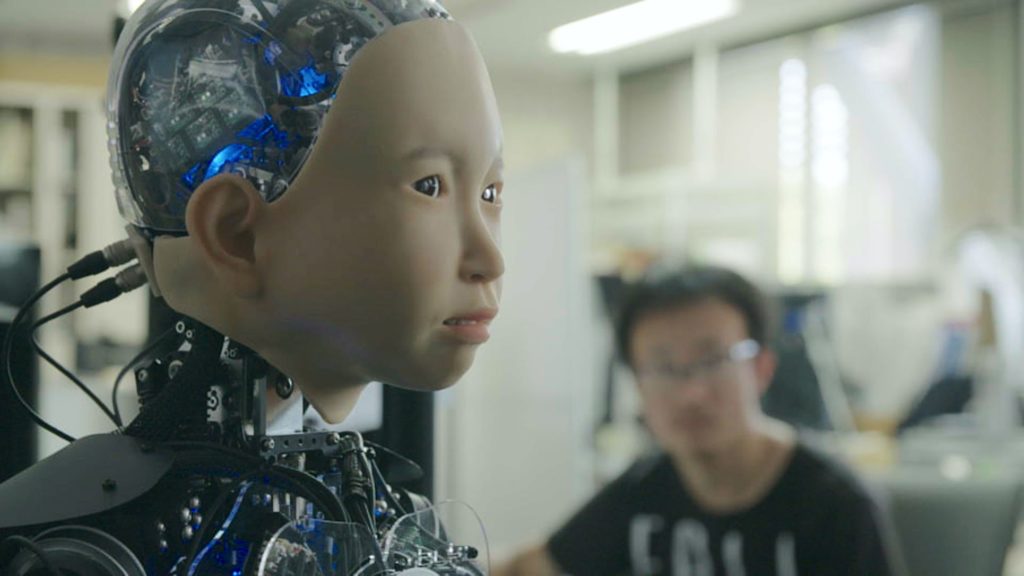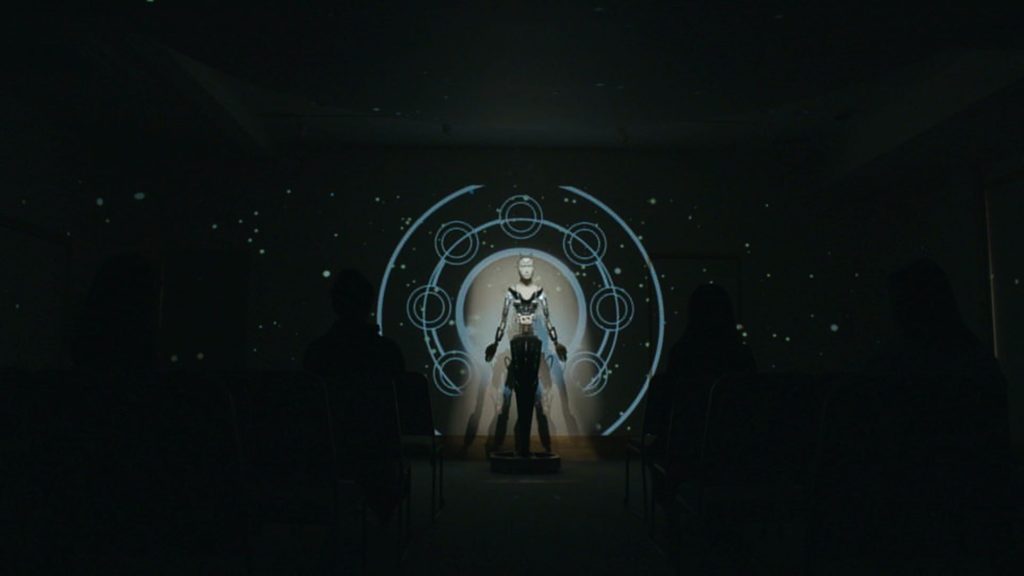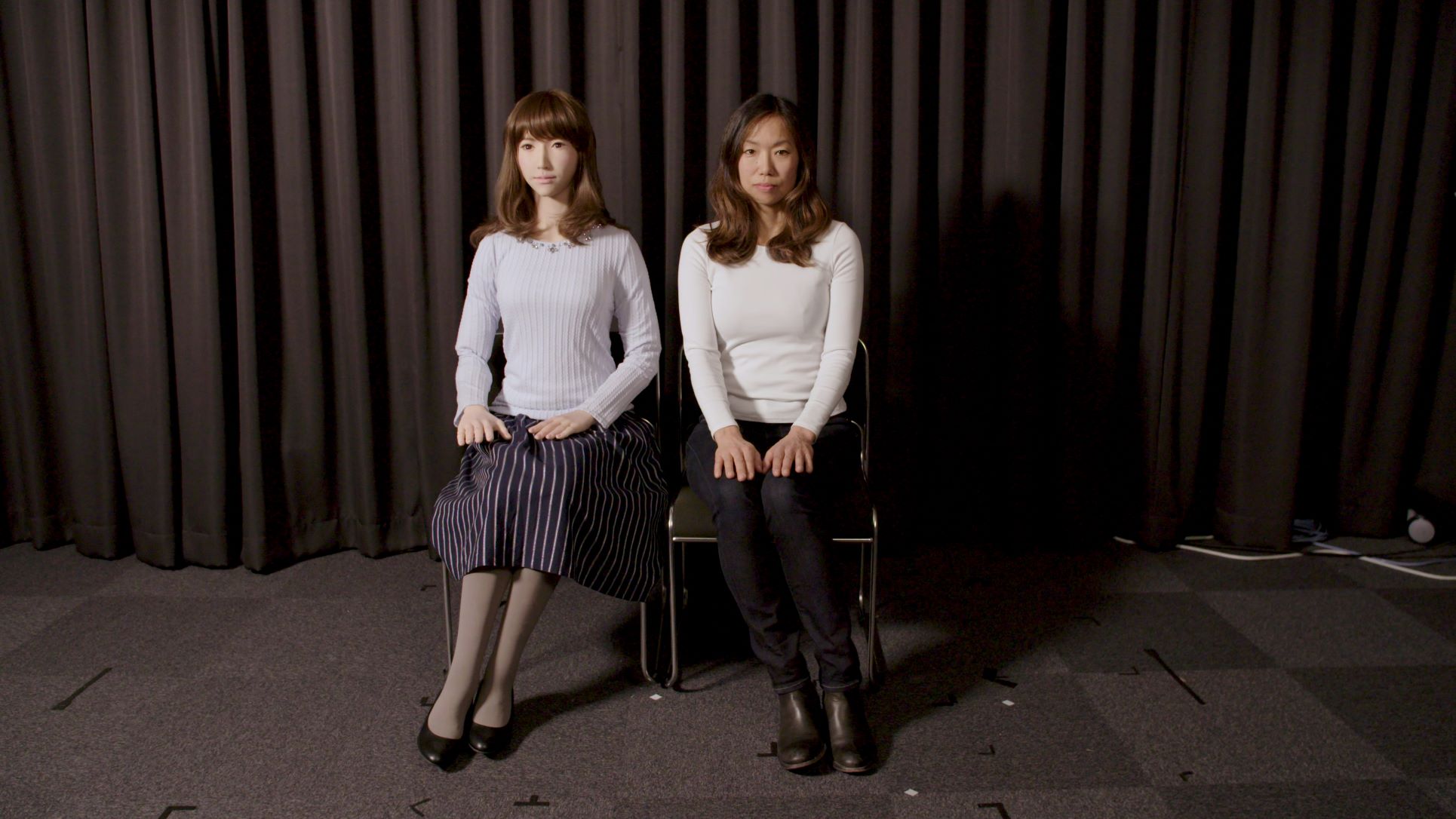It was the late, great Freddie Mercury who famously asked, “Who wants to live forever?” Prolific Toronto filmmaker Ann Shin’s latest documentary provocatively tries to answer this quandary and asks questions of her own. A.rtificial I.mmortality dives into the world of transhumanism, where people seek to live forever in a digital state. They continue to live via robotics or on-screen avatars long after their flesh decomposes. The film, this year’s Hot Docs opening night selection, is a fittingly if frustratingly virtual affair as the pandemic continues to affect in-person screenings.
Such an honour should come as no surprise. Shin frequently explores complex and nuanced topics, from 2012’s The Defector: Escape from North Korea to her Oscar-shortlisted 2015 short My Enemy, My Brother and 2017 feature of the same name about soldiers from rival armies who meet on the battlefield. That project resulted in the VR experience Eye of the Beholder, which further explored how we witness events and how different perspectives dramatically shape what we believe.
A.rtificial I.mmortality is told through a series of talking-head interviews with advocates, researchers, and skeptics. Shin’s film looks at people trying to realise what’s long been the dream of science fiction writers: fostering the upload of one’s memories, thoughts, and personality into a system that will outlast any biological lifetime. The religious, societal, and philosophical implications are deep, and Shin’s film compellingly navigates these various facets.
Shin herself became a somewhat reluctant on-screen participant during her journey with AI. She scanned herself and recorded some stories in her voice to be implemented by an Artificial Intelligence firm in order to fabricate a formal digital avatar that could answer direct questions and provide narratives to her children. “It was very strange,” Shin admits. “I actually didn’t even want to be in the film to begin with.” The result actually has two Shins on screen—the mother, daughter, and filmmaker coming to terms with the complexity of this subject, and then the digital version with which her family members can directly communicate. “First, there’s the avatar representation, and then there’s me, and then there’s also me on video,” explains Shin. “It is kind of weird to watch later in the edit suite.”
One powerful storyline involves Shin’s aging father, whose memory fades as he suffers from dementia. The loss of aspects of his personality built over a lifetime touches Shin deeply and has the potential to affect viewers similarly. Yet despite these intensely personal elements, Shin does not see this as strictly a personal story. “I see myself as a conduit to explore that issue in the film,” she argues, “rather than seeing the film as my little diary entry.”
COVID-19 and its global impact has shaped numerous projects, and A.rtificial I.mmortality is no exception. Shin points out that those suffering from dementia like her father have been “made worse because they were so isolated,” providing a perfect illustration of the fragility of memory that those seeking a digital solution are tackling directly.

The pandemic shaped the film in other, more overt, ways. “Production had to halt halfway through COVID,” says Shin. “We already had conducted interviews about how there’s this growing amassing of data sets by large companies that are building the Artificial General Intelligences [AGIs] of tomorrow.” These companies range from small startups to some of the most powerful corporations. “The Amazons, the Googles—they are shaping the AGIs of tomorrow,” observes Shin, “We had conversations about these topics already in the can before COVID.”
Shin spoke to scientists and advocates alike about this burgeoning field. “They were saying that personality or intuition can be broken down into a summation of your past experiences, and your inner predilections,” Shin explains. “If you map them on a computer with those data sets, that computer would be able to reproduce the same kind of intuitive, snap judgment that you would.” The argument is that beyond a mere catalogue of experiences, this forms a self-aware system, whereby one’s self is “programmable and replicable.” We’d therefore be able to “transfer consciousness” into a computer with an avatar on screen or even a robotic representation, and thus become, in the overt sense of the word, immortal.
When the lockdown occurred, Shin’s view on the topic began to shift. She began to reflect on the “eerie resonance” she saw in the growing number of digital representations people create in digital spaces. “When we started filming, I would hear that everyone is going to have an avatar in five to ten years,” explains Shin, “I didn’t give it much thought, but now I realize that even with Zoom, there are filters that make you look better than you actually do. There are avatars that have been developed to represent you on digital platforms.” During COVID, in particular, “this has become another extension of how we interact with one another.”
This need to navigate virtual interconnections has also been shared with local filmmakers. “The Canadian documentary filmmaking community is really tight,” Shin says, noting that she connects with fellow filmmakers online through a Yahoo group that invites collaboration over competition. “We have a mutual admiration for the passion behind these projects and want to support one another,” notes Shin. “As Canadians, we’re uniquely poised to be on the pulse of what’s happening, while having an objective and critical point of view about it.”

Shin’s film employs this multifaceted point of view, which speaks to the complexity of the subject. For much of the film, we hear from voices that enthusiastically embrace some of the more optimistic facets of the transhumanistic dream. Shin also provides space for perspectives that argue the endeavour is folly. They say AI merely mimicks human thought and reduces the mind to a series of snapshots that serve as touchstone moments. This balance was key for Shin. “It’s important to incorporate other voices because there are so many moral issues around the development of this technology, about where and how we choose to use our resources and how AI is developed.”
Shin argues that considerations of AI are especially relevant when social media dominates access to information. “I started this film believing that an avatar is not going to make you immortal. I started out as a skeptic, an anti-avatar, anti-artificial immortality person, and now I’m more in the middle,” admits Shin.
One could say that film itself provides a kind of immortality, and it’s easy to see how the doc offers a lasting repository for Shin. It preserves this stage of her career, from the late period of her father’s life to the inquisitiveness of her adolescent children who continue to build their own memories and experiences.
“That is something we wrestled with it a lot during the making and the editing of this film,” says Shin. “What is the difference between becoming truly immortal, and just having an amazing legacy with high fidelity? I think that filmmaking or writing or any kind of art leaves a legacy. Before, it was texts, paintings, and drawings. Then it became photographs and then videos, and now AI avatars are the latest thing.”
Shin remains skeptical that the artificial version could truly replace what makes us human. “I think that I’m spiritual at heart,” she says. Despite the journey she took with this project, Shin believes that the AI process “is not really gaining true immortality.” As for how she sees her own filmmaking, Shin’s perspective is uniquely human. “Like all artists, I’m driven, I’m curious, I want to investigate and create,” she observes. “This is my process of just being in the world, to channel this piece of history that I’m living through.”
Hot Docs runs April 29 to May 9.
Update: A.rtificial I.mmortality is now streaming on Tënk.













